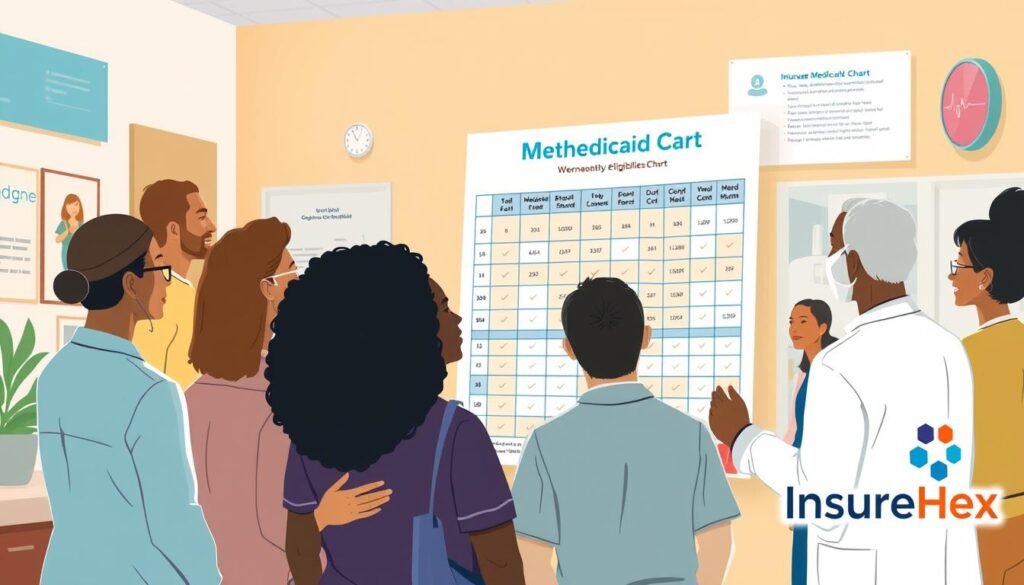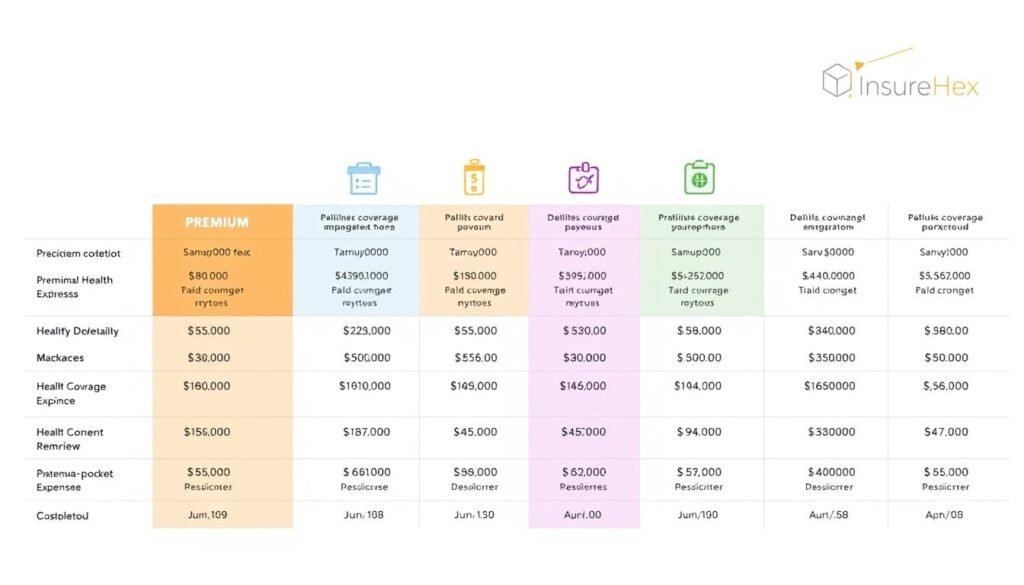Finding the right health plan can seem overwhelming. But, it’s key for you and your family’s well-being. We’ll look at many health coverage options. This includes plans from employers and government programs. Our goal is to help you choose wisely and get the protection you need.
Before we get into the details, let’s ask a question: Do you know all the healthcare benefits you can get? Many people don’t realize the full range of options available. They might settle for less than what they need. We aim to show you the best options for your health and family’s needs.
Key Takeaways
- Understand the importance of evaluating your current health status and family’s requirements to find the ideal health coverage plan.
- Explore the various healthcare options available, including employer-sponsored plans, individual private insurance, Medicare, and Medicaid.
- Learn how to navigate the health insurance marketplace and compare plans based on premiums, deductibles, and out-of-pocket expenses.
- Discover alternative healthcare solutions, such as health sharing ministries and short-term insurance plans, that may better suit your needs and budget.
- Familiarize yourself with the Affordable Care Act (ACA) and its impact on health insurance marketplaces and coverage options.
Understanding Your Health Coverage Needs
Finding the right health coverage plan starts with knowing your healthcare needs. Look at your current health and your family’s needs. This helps you find the best health coverage needs for you.
Assessing Your Current Health Status
Examine your overall health and any pre-existing conditions. Think about your age, medical history, and how often you see doctors or take medicine. This info helps you pick the right health coverage for your health status.
Evaluating Your Family’s Requirements
If you have a family, it’s key to look at their family health requirements. Consider each family member’s age, medical needs, and any special situations. This ensures your health coverage protects and supports your whole family.
“Identifying your healthcare needs is the first step towards finding the right health coverage plan that meets your individual and family requirements.”
Understanding your health coverage needs helps you make smart choices. You can pick a plan that offers great coverage, benefits, and value for your situation.
Exploring Health Insurance Marketplace Options
The Affordable Care Act created the health insurance marketplace. It offers many health coverage options for people and families in the U.S. Here, you can compare and choose plans that fit your health needs and budget.
This marketplace is a one-stop-shop for private health insurance plans. Each plan has its own benefits, costs, and rules. You can use this platform to make a choice that works for you.
Evaluating Marketplace Plans
In the health insurance marketplace, you’ll see different plan types. These include Bronze, Silver, Gold, and Platinum plans. Each type has its own monthly cost, deductibles, and out-of-pocket expenses. This lets you find a plan that balances coverage and cost.
| Plan Category | Average Monthly Premium | Deductible Range | Out-of-Pocket Maximum |
|---|---|---|---|
| Bronze | $331 | $6,300 – $8,550 | $8,700 |
| Silver | $479 | $4,500 – $7,050 | $8,700 |
| Gold | $567 | $1,500 – $3,000 | $8,700 |
| Platinum | $663 | $0 – $2,000 | $6,300 |
By looking at these plan details, you can pick the best one for you. It should match your health needs and budget.

The health insurance marketplace has many options. Take your time to look at and compare them. This way, you’ll find the health insurance coverage that protects and reassures you and your family.
Navigating Employer-Sponsored Health Plans
Many Americans get their health insurance from their jobs. We’ll look at how to check if these plans are good for you. We’ll also talk about Health Savings Accounts (HSAs) and how they help with healthcare costs.
Evaluating Group Health Insurance Benefits
It’s key to check the benefits of your employer’s health plan. Look at what’s covered, like deductibles and co-pays. Also, see if you can see your doctors and if there are any limits on care.
Understanding Health Savings Accounts (HSAs)
Health Savings Accounts (HSAs) help with healthcare costs. They’re for people with high-deductible plans. By using an HSA, you can save for medical expenses and get tax benefits.
To use an HSA well, know what you can pay for with it. Plan ahead to manage your healthcare costs better.
“Employer-sponsored health plans can offer a comprehensive and cost-effective solution for many individuals and families, but it’s important to carefully evaluate the benefits and understand the role of tools like Health Savings Accounts.”
Health Coverage Options for Individuals
If you’re not covered by work or government programs, private health insurance is a good option. We’ll look at the different individual health coverage plans. This includes their coverage, costs, and how to apply, to help you choose wisely.
Comparing Private Health Insurance Plans
There are many private health insurance plans for individuals. Each plan has its own coverage, deductibles, copays, and monthly costs. Some common health insurance for individuals includes:
- Preferred Provider Organization (PPO) plans: These offer more flexibility in choosing healthcare providers, but typically have higher premiums.
- Health Maintenance Organization (HMO) plans: These have lower premiums but require you to stay within the plan’s network of providers.
- High-Deductible Health Plans (HDHPs): These plans have lower monthly premiums but higher deductibles, making them a good choice for healthier individuals.
- Catastrophic plans: These low-cost plans provide coverage for unexpected, high-cost medical events, but have higher deductibles and limited coverage.
| Plan Type | Premiums | Deductibles | Provider Network |
|---|---|---|---|
| PPO | Higher | Lower | Flexible |
| HMO | Lower | Higher | Restrictive |
| HDHP | Lower | Higher | Flexible |
| Catastrophic | Lower | Higher | Flexible |
When picking a private health insurance plan, think about your health needs, budget, and how flexible you want your provider choices to be.

Medicare: Coverage for Seniors and Individuals with Disabilities
Medicare is a federal health insurance program. It covers seniors aged 65 and older, and those with certain disabilities. It offers a wide range of medical services, like hospital stays and doctor visits. Knowing about Medicare’s parts can help you choose the right healthcare coverage.
The Medicare program has several parts, each with its own benefits:
- Part A covers inpatient hospital stays and skilled nursing care.
- Part B includes outpatient care and preventive services.
- Part D helps with prescription drug costs, offered by private companies.
- Part C, or Medicare Advantage, combines Parts A, B, and D into one plan.
To qualify for Medicare, you must be 65 or older, or have a disability. People with end-stage renal disease or ALS may also qualify. Medicare aims to ensure seniors and disabled individuals have access to necessary care.
“Medicare is a crucial safety net for millions of Americans, providing access to affordable healthcare and protecting the well-being of our senior citizens and those living with disabilities.”
Understanding Medicare’s benefits and eligibility can guide your health insurance choices. Whether you’re a senior or have a disability, exploring Medicare options can give you peace of mind and security.
Medicaid: A Safety Net for Low-Income Individuals
Medicaid is a key health coverage program for low-income people and families. It’s run by states and offers many medical benefits. These include doctor visits, hospital care, and prescription drugs for those who qualify.
Eligibility Requirements for Medicaid
To qualify for Medicaid, you must meet certain criteria. This includes income, household size, disability, and age. You must have an income below a certain level, which varies by state. Some states also offer Medicaid to more low-income adults thanks to the Affordable Care Act.
- Income level: Medicaid eligibility is based on a percentage of the federal poverty level. This percentage can range from 138% to 200% depending on the state.
- Household size: The number of people in your household, including dependents, can affect Medicaid eligibility.
- Disability status: People with certified disabilities may qualify for Medicaid, no matter their income.
- Age: Medicaid covers children, pregnant women, and adults, including those aged 65 and older.
Knowing the Medicaid eligibility requirements helps low-income individuals get the health coverage they need. This coverage is crucial for their health and managing medical conditions.
“Medicaid is a lifeline for millions of Americans who would otherwise struggle to afford the healthcare they need.”

Affordable Care Act (ACA) and Health Insurance Marketplaces
The Affordable Care Act (ACA), also known as Obamacare, has changed the U.S. healthcare scene. It introduced health insurance marketplaces. These are places where people can find and buy health coverage that’s easy on the wallet.
The ACA’s health insurance marketplaces, or health insurance marketplaces, are online spots. They let people compare and sign up for health plans. This way, everyone can get quality healthcare.
These marketplaces have many health plans. You can find plans from private companies and state programs. It’s easy to compare them by looking at coverage, deductibles, and costs. This helps people choose the best plan for their health needs.
- All Marketplace plans must cover the 10 essential health benefits. This includes things like doctor visits, emergency care, and maternity care.
- Many plans also offer extra coverage, like dental and vision. This makes healthcare even more valuable and accessible.
The Affordable Care Act and its health insurance marketplaces have been key. They’ve made it easier for people to get ACA health coverage. Now, everyone has a chance to get the healthcare they need.
“The Affordable Care Act has been a game-changer, making healthcare more accessible and affordable for millions of Americans.”
Health coverage options
Finding the right health coverage can be tough. But knowing your options is the first step. You might look at employer plans, private insurance, or government programs. We’ll look at these health coverage options, their main features, and what to consider when choosing.
Employer-Sponsored Health Plans
If you have a job, your employer might offer a group health insurance plan. These plans can include HMOs, PPOs, and high-deductible plans with HSAs. It’s important to check the coverage, costs, and what you’ll pay out of pocket to find the best plan for you and your family.
Individual Health Insurance Plans
If you don’t have a job plan, the individual health insurance market has many medical insurance plans. These plans differ in what they cover, deductibles, and how much they cost. It’s key to compare them well to get the right balance of coverage and cost.
Government-Sponsored Health Programs
- Medicare: For people 65 and older or with disabilities, Medicare covers hospital stays, outpatient care, and drugs.
- Medicaid: A program for low-income people and families, with rules that change by state.
- Affordable Care Act (ACA) Marketplaces: The ACA set up places where you can compare and sign up for health plans that meet certain standards.
Looking at these health coverage options and understanding each one can help you choose wisely. This choice should match your health needs and budget.
“The key to finding the right health plan is to assess your specific needs and explore the available options thoroughly.”
Exploring Alternative Health Coverage Solutions
Traditional health insurance is common, but there are other options. We’ll look at health sharing ministries and short-term health insurance. We’ll talk about their good and bad points and how they might fit into your health plan.
Understanding Health Sharing Ministries
Health sharing ministries are groups that share medical costs. They are often faith-based and an alternative to regular health insurance. Members pool their money to help pay for each other’s medical bills, often at a lower cost than regular insurance.
But, it’s key to know that health sharing ministries are not insurance. They have different rules for coverage and joining.
Evaluating Short-Term Health Insurance Plans
Short-term health insurance is for those between jobs or waiting for their employer’s plan. These plans are cheaper but have limited coverage. They might not cover all the benefits needed by the Affordable Care Act.
Before picking a short-term plan, check the details carefully. Make sure it fits your health needs.
| Health Sharing Ministries | Short-Term Health Insurance |
|---|---|
| Faith-based, nonprofit organizations | Temporary coverage for individuals |
| Members share medical expenses | Lower monthly premiums |
| May have different coverage requirements | Limited coverage, may not include essential benefits |
Knowing the good and bad of these options helps you choose wisely. Whether it’s a health sharing ministry, a short-term plan, or regular insurance, pick what’s best for you and your family.
Balancing Costs and Coverage: Finding the Right Fit
Choosing the right health insurance plan is a delicate balance. It’s about managing your healthcare costs and getting the coverage you need. Understanding premiums, deductibles, and out-of-pocket expenses is key. This helps you find a plan that fits your needs and budget.
Comparing Premiums, Deductibles, and Out-of-Pocket Expenses
Premiums are the monthly or annual fees for coverage. Deductibles are what you pay before your insurance kicks in. Out-of-pocket expenses include deductibles, copays, and coinsurance, your share of medical costs.
When comparing plans, ask yourself these questions to balance costs and coverage:
- What are the premiums for each plan, and how do they fit within your monthly budget?
- What are the deductibles, and can you comfortably afford to meet them if you need medical care?
- What are the out-of-pocket expenses associated with each plan, and how do they impact your overall healthcare spending?

By carefully evaluating these factors, you can find a health insurance plan. It should provide the coverage you need while keeping your health coverage costs manageable.
Navigating Open Enrollment Periods and Special Enrollment
Timing is key when it comes to health coverage. We’ll help you understand open enrollment periods and special enrollment. This way, you can pick the right plan at the right time.
The open enrollment period is a yearly time when you can sign up for health insurance. It’s a big deal because missing it means waiting a whole year. Knowing the exact dates and deadlines is vital to keep your coverage.
But, life can surprise us, and sometimes you might qualify for a special enrollment period. These periods let you enroll or change plans outside the usual time. Qualifying events include:
- Getting married or divorced
- Having a baby or adopting a child
- Losing other health coverage
- Moving to a new home in a different area
It’s important to know what each special enrollment requires. This way, you can get the coverage you need when you need it most.
“Timing is everything when it comes to health insurance enrollment. Staying informed about open enrollment periods and special enrollment criteria can make all the difference in protecting your health and finances.”
By understanding open enrollment and special enrollment, you can find the best health plan for you. Our team is here to help and support you every step of the way.
Staying Compliant: Understanding Health Insurance Regulations
It’s vital for both individuals and businesses to follow health insurance regulations. We’ll cover the main rules, like the Affordable Care Act (ACA) rules. This will help you keep your health coverage up to date.
The ACA has brought in new rules to improve health coverage. These rules tackle problems like unfair selection, pre-existing conditions, and how insurers set prices. They make sure everyone can get good health insurance that’s affordable.
- Guaranteed issue and renewability: Insurers must offer coverage to everyone, no matter their health.
- Prohibition on pre-existing condition exclusions: Insurers can’t refuse or limit coverage because of health issues.
- Essential health benefits: All plans must cover important services like hospital stays, drugs, and preventive care.
There are also other healthcare compliance rules for health plans and providers. These include:
- Affordability and subsidies: The ACA sets rules for plan costs and offers help to those who can’t afford it.
- Reporting and disclosure: Insurers must share information on plan quality and costs, and clearly explain coverage options.
- Review and appeals: Consumers can appeal decisions, and insurers must have fair and clear processes.
The health insurance regulations world is always changing. By keeping up and following the rules, you can make sure your health coverage is right. This protects your health and finances.

“Navigating the complex web of health insurance regulations is crucial for maintaining coverage and protecting your financial well-being. Stay informed and proactive to ensure your health plan remains compliant.”
https://insurehex.com/insurance-benefits-explained-your-complete-guide/
Insurance Benefits Explained: Your Complete Guide
Conclusion
We’ve looked at many health coverage options together. Now, we know how to find the right healthcare plan for us. We’ve talked about checking our health status and family needs. We’ve also explored employer plans, private insurance, Medicare, and Medicaid.
Understanding the Affordable Care Act (ACA) and health insurance marketplaces is key. We’ve seen how to get quality coverage through these avenues. We’ve also looked at other options like health sharing ministries and short-term plans.
Finding the best health coverage is about balancing costs, coverage, and what you prefer. As you look for the right plan, stay informed and use all resources available. Choose the option that offers the most value and protection for your health.

